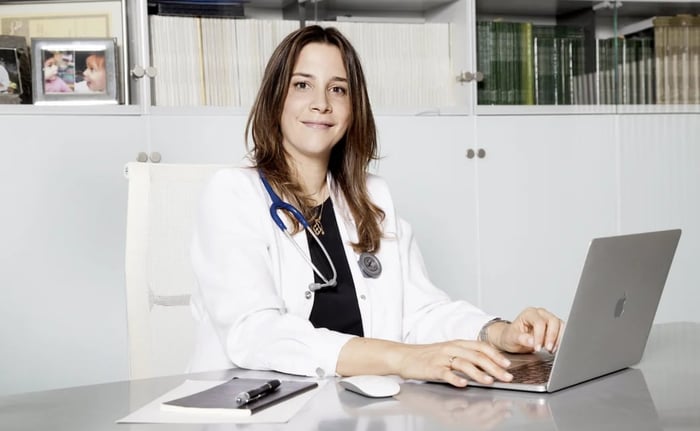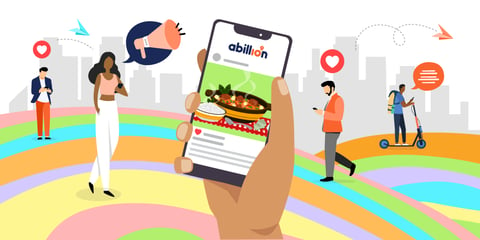 Photo: Plant Based Clinic
Photo: Plant Based Clinic
Dr Silvia Goggi is a multi-hyphenate. She’s a physician, entrepreneur, influencer, published author of three books and most recently, an abillion ambassador.
These roles are varied, but they coalesce around vegan advocacy. As a physician who specializes in nutritional science, she assists patients in planning their diet through her clinical practice and Plant Based Clinic, a telemedical business she founded.
On social media, she’s an outspoken advocate for veganism, putting out content that guides her followers towards better health, a better planet and where no animals are harmed. One of the biggest hurdles she faces? Dispelling myths – often the same ones over and over again.
We chat with the Milanese physician on how she went vegan, the importance of having a trained doctor that approaches medicine with no prejudice towards plant-based diets, and addressing the top three misconceptions people have once and for all.
You are a surgeon by training and a specialist in nutritional science. What was the moment in your life that influenced your decision to follow a plant-based diet?
My decision to go plant-based happened almost eight years ago during my specialization in college. A friend of mine, also a doctor, wanted to go vegan while breastfeeding. I was hoping to change her mind because I thought it was a dangerous gamble. So I set out to study the scientific literature on the subject.
That afternoon, shocked that it was not only possible but also the healthiest choice possible, I made the decision to go vegan myself. I wondered how it was possible that I had never been interested in the topic? I didn't want to waste any more time. Between deciding and becoming a vegan, I spent some time as a vegetarian taking measurements and planning my diet. I started from an omnivorous diet where vegetables were just a salad at meals and some fruit during the week.
 Photo: Hermes Rivera
Photo: Hermes Rivera
Did you encounter negative comments from people close to you when you decided to go plant-based?
Family and friends were not an obstacle at all, and neither were colleagues. Of course people made jokes and banter throughout my years of specialization, but that only made me more determined. I still haven't understood why every doctor and nutritionist in the world isn’t following a plant-based diet. The scientific literature is so clear on the subject.
What are the top three prejudices and misconceptions of a plant-based diet and could you debunk them for us?
It makes you fat, because it is rich in carbohydrates from legumes, grains and fruits. Actually, it’s the opposite. With a vegan diet, it is easier to maintain your weight or lose it if you need to, because vegetables have a lower caloric density. In other words, you eat more in volume, taking in more nutrients and (slightly) less energy. This obviously applies to a plant-based diet that’s rich in vegetables in their natural, whole form, not one that relies on processed products.
It's low in protein. It's 2022, but this myth still hasn’t died. Is it possible that no one remembers middle school biology classes, when they explained to us that plants fix nitrogen into organic molecules by incorporating them into amino acids? A plant-based diet has all the proteins and amino acids you need; in fact, it has more!
It’s expensive. This circulating myth is a real shame, because it prevents people from saving a lot of money. In fact, a plant-based diet is significantly cheaper. With everything else being equal, i.e. grains, vegetables, fruits, seeds and nuts that should be present in any kind of diet, legumes are one of the cheapest protein sources.
 Photo: Egor Myznik
Photo: Egor Myznik
One year ago you founded the Plant Based Clinic, the first vegan telemedicine clinic where specialists use plant-based nutrition and lifestyle modifications as the main tools for therapy and prevention. What was your mission back then and how do you aim to change/challenge the biases toward veganism?
Even before the boom of telemedicine that we have seen during the pandemic, I did “tele-visits” with patients across Italy and the world. I realized how difficult it was to find doctors and nutritionists who were not prejudiced against patients following a plant-based diet.
If anything, they should be enthusiastic about it. It is not always easy to find someone who is competent in plant-based nutrition where you live, and with telemedicine, this obstacle can be overcome. I would like to see that anyone who needs a doctor and/or nutritionist who is knowledgeable on the subject would be able to reach out and get a vegan diet plan no matter where they live in the world.
Balance is key in a plant-based diet. What are the essential items that every vegan should stock in their pantry to cover basic nutritional needs?
The truth is that everyone, including non-vegans, should have a very similar fridge and pantry. They should not lack:
- Seasonal vegetables to eat at least at the two main meals, i.e. lunch and dinner
- Fruit for snacks or to enrich salads and breakfasts
- Legumes (even in jars) and their derivatives, such as chickpea flour, tofu, soy milk, tempeh, etc..
- Dried fruits
- Oil seeds and their butters
All of these items should be present in addition to your favorite spices and herbs. And vitamin B12!
 Photo: Alexandr Podvalny
Photo: Alexandr Podvalny



